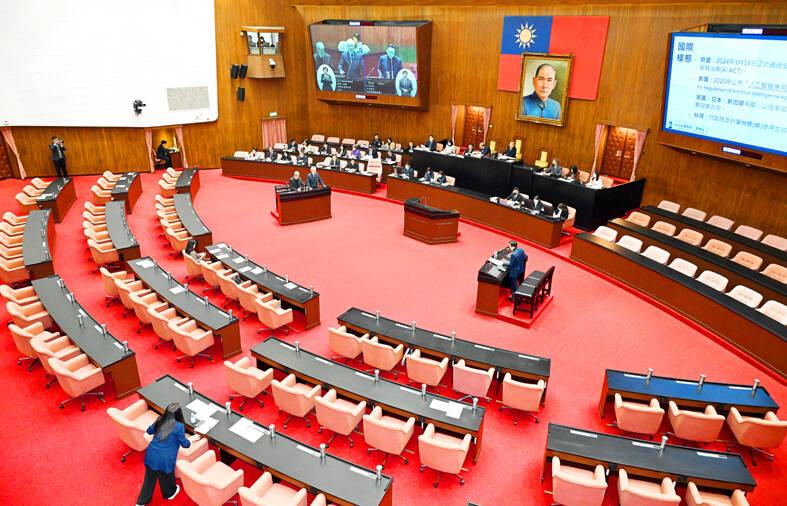Chinese Nationalist Party (KMT) Legislator Hsu Yu-chen (許宇甄) today proposed amendments to Taiwan’s martial law legislation in light of South Korea’s short-lived emergency declaration on Tuesday last week.
Taiwan’s Martial Law Act (戒嚴法), which has not been changed since April 1948, contains large loopholes, Hsu said in a news release.
Hsu’s proposed changes to the Martial Law Act and the Act Governing the Legislative Yuan’s Power (立法院職權行使法) seek to protect Taiwan’s democracy from exploitation by shortening the time frame during which a president’s martial law declaration must be approved by the Legislative Yuan from one month to 24 hours, she said.

Photo: Liao Chen-huei, Taipei Times
South Korean President Yoon Suk-yeol last week suddenly declared martial law and deployed troops to the National Assembly.
After 190 lawmakers voted to reject the motion, Yoon revoked the order within two hours of its announcement.
Hsu said the South Korean parliament’s veto led her to look at Taiwan’s own legislation.
Taiwan’s law states that, after a president has declared martial law, it must be sent to the Legislative Yuan for ratification within one month, she said.
In other words, there is an entire month during which the president could abuse their power, deploy troops and seize political opponents, she said.
The current legislation also does not clarify a process or time period for the Legislative Yuan to examine and deliberate a martial law declaration, she said.
Within two hours of Yoon’s emergency declaration, the South Korean National Assembly gathered to reject the measure, Hsu said.
She therefore drafted an amendment to Article 1 of the Martial Law Act requiring the president to report to the Legislative Yuan within eight hours and enforcing a 24-hour limit for the chamber to examine the proposal and come to a decision, she said.
If a decision is not reached, martial law would not take effect, she said.
Taiwan’s democratic system was hard-earned and must be protected by all Taiwanese to avoid a minority finding loopholes to exploit, she said.
The proposal would be submitted to the Legislative Yuan’s Procedure Committee tomorrow, she said.
The first reading would likely be completed on Friday before being referred to the appropriate committees for examination, she added.
At a separate news conference, Democratic Progressive Party (DPP) caucus chief executive Rosalia Wu (吳思瑤) said that the party has been clear that it opposes any use of martial law.
The KMT is sensationalizing martial law and using it as a political bargaining chip, DPP Legislator Tsai Yi-yu (蔡易餘) added.
The KMT were the instigators of 38 years of martial law in Taiwan, Wu said, questioning the necessity and urgency of discussing the matter, particularly as the main objective of the current session is to pass the government budget.

An essay competition jointly organized by a local writing society and a publisher affiliated with the Chinese Communist Party (CCP) might have contravened the Act Governing Relations Between the People of the Taiwan Area and the Mainland Area (臺灣地區與大陸地區人民關係條例), the Mainland Affairs Council (MAC) said on Thursday. “In this case, the partner organization is clearly an agency under the CCP’s Fujian Provincial Committee,” MAC Deputy Minister and spokesperson Liang Wen-chieh (梁文傑) said at a news briefing in Taipei. “It also involves bringing Taiwanese students to China with all-expenses-paid arrangements to attend award ceremonies and camps,” Liang said. Those two “characteristics” are typically sufficient

A magnitude 5.9 earthquake that struck about 33km off the coast of Hualien City was the "main shock" in a series of quakes in the area, with aftershocks expected over the next three days, the Central Weather Administration (CWA) said yesterday. Prior to the magnitude 5.9 quake shaking most of Taiwan at 6:53pm yesterday, six other earthquakes stronger than a magnitude of 4, starting with a magnitude 5.5 quake at 6:09pm, occurred in the area. CWA Seismological Center Director Wu Chien-fu (吳健富) confirmed that the quakes were all part of the same series and that the magnitude 5.5 temblor was

The brilliant blue waters, thick foliage and bucolic atmosphere on this seemingly idyllic archipelago deep in the Pacific Ocean belie the key role it now plays in a titanic geopolitical struggle. Palau is again on the front line as China, and the US and its allies prepare their forces in an intensifying contest for control over the Asia-Pacific region. The democratic nation of just 17,000 people hosts US-controlled airstrips and soon-to-be-completed radar installations that the US military describes as “critical” to monitoring vast swathes of water and airspace. It is also a key piece of the second island chain, a string of

The Central Weather Administration has issued a heat alert for southeastern Taiwan, warning of temperatures as high as 36°C today, while alerting some coastal areas of strong winds later in the day. Kaohsiung’s Neimen District (內門) and Pingtung County’s Neipu Township (內埔) are under an orange heat alert, which warns of temperatures as high as 36°C for three consecutive days, the CWA said, citing southwest winds. The heat would also extend to Tainan’s Nansi (楠西) and Yujing (玉井) districts, as well as Pingtung’s Gaoshu (高樹), Yanpu (鹽埔) and Majia (瑪家) townships, it said, forecasting highs of up to 36°C in those areas